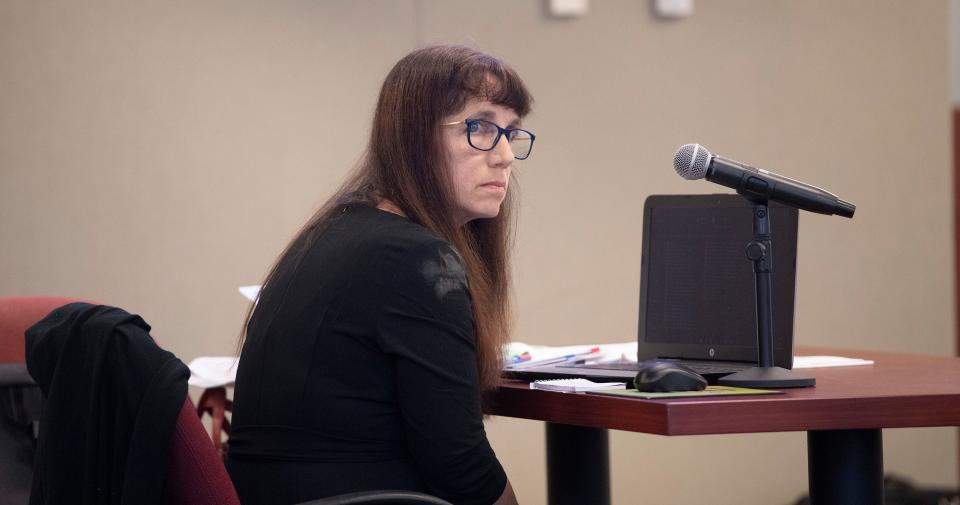Escambia County looks to recoup cost of court challenges from community activist
- Oops!Something went wrong.Please try again later.
This story has been updated to correct a mistake that appeared in the original. Jacqueline Rogers has filed three previous challenges to the county's Sector Plan opt-outs. Only two of those challenges have gone before an administrative law judge before the current case.
Escambia County is looking to recover attorney's fees from community activist Jacqueline Rogers over her latest challenge to an opt out of the county's Optional Sector Plan.
Escambia County granted an opt-out request for a 100-acre property on U.S. Highway 29 near Rogers' neighborhood north of Cantonment in September.
Administrative Law Judge Gary Early held a hearing Monday on Rogers' challenge at the Escambia County Central Office Complex off of Fairfield Drive. Early made no ruling, but both sides brought witnesses to make their case, with Escambia County hiring planning expert Kenneth Metcalf.

As part of their legal filings in the case, the county is seeking a ruling in the case to recover their attorney's fees and legal cost arguing that Rogers' latest challenge is a "bad faith filing."
The latest case is the fourth time Rogers has filed a challenge against the county for allowing a property owner to opt-out of the sector plan, and the third time the case has gone all the way to a hearing before an administrative law judge.
In the three cases that have gone before a judge, Escambia County ultimately won with the opt-outs being allowed.
In a separate case, Rogers also challenged a zoning change related to the property of the first opt-out where the Florida Department of Economic Opportunity agreed with Rogers that the zoning was not in compliance with the county's comprehensive plan, but the county amended the ordinance to bring it in compliance before the case went before a judge.
Rogers also challenged a zoning change to allow the creation of rural communities and won with the Governor's Cabinet upholding a ruling that Escambia County did not conduct the proper data and analysis when it implemented the zoning change.
Unwinding the Sector PlanWhy Escambia County is dismantling the sector plan guiding growth in the north end
First challenge wonEscambia County wins challenge to sector plan opt-out, but appeal could be coming
First Sector Plan developmentNew 316-home development coming to Cantonment under Optional Sector Plan
"Escambia County is not always right, either, and I believe it's a citizen's right to petition," Rogers said. "And that's what DOAH (Department of Administrative Hearings) is here for."
The Optional Sector Plan, originally named the Mid-West Sector Plan, covers a vast swath of land north of Beulah stretching to meet U.S. 29. In total, more than 15,000 acres are included in the plan.
The Sector Plan was adopted in 2011, seeking to manage growth in the area, but much of the land in the plan remains undeveloped.
In Florida, only seven sector plans have been adopted, and most only have a handful of landowners who initially helped create them. Escambia County's plan creation was driven by three large landholders, but the ultimate plan affected the property of about 1,500 landowners.
In 2017, former Escambia County Commissioner Wilson Robertson, who voted to approve the plan, sought to opt out of a small property he owned that was contained within the sector plan. Escambia County approved the opt-out, and Rogers filed her first challenge arguing that the opt-out would set the precedent for opting-out any property in the plan.
Under Florida law, opt-outs are allowed as long as they are consistent with the county's long-term comprehensive plan.
At the time, Rogers said she didn't agree with how the sector plan was created, but now that it was in effect, the county should follow its own plan.
Rogers argued that one of the plan's biggest benefits is that it preserved many areas as conservation neighborhoods.
Other property owners who said they only became aware of the Sector Plan after it had been passed saw restrictions placed on their property which amounted to a "taking" of the property. Since the first opt-out in 2017, several more opt-outs have been sought.
Last year, Escambia County began looking into unwinding the sector plan but hasn't made much progress.
"The intent was good, and I still think the intent was good," Commissioner Steve Barry said to the County Commission in July 2021. "… I thought it would still be kind of manageable for us to keep in place and try to keep the good parts of it. … In this case, it just hasn't worked out."
On Tuesday, Early said he hopes to decide the case by the end of January.
This article originally appeared on Pensacola News Journal: Escambia County looks to recoup cost of court challenges from activist

